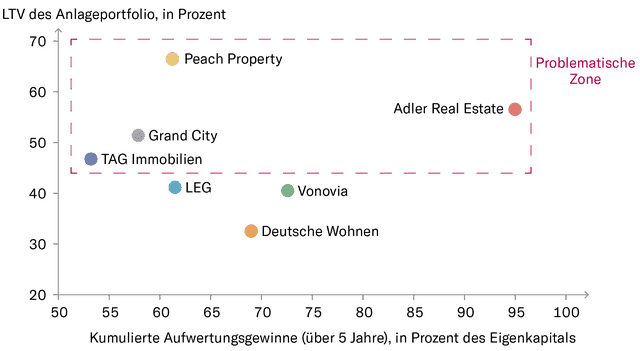After Wirecard now Adler? On Friday evening, KPMG refused the ailing group the annual financial statements. In addition, long-standing allegations of fraud could not be clarified to the satisfaction of the shareholders. The affair was triggered by the short seller, who was also involved with Wirecard.
View of the high-rise at the Steglitzer Kreisel in Berlin: Allegedly, there has been little progress in Adler’s prestige project for a long time.
The news shook investors on Friday evening shortly before the stock market closed and finally plunged a large German real estate group into a veritable crisis: KPMG refuses the attestation of the Adler Group. The auditors do not see themselves in a position to issue an audit opinion on the balance sheet and therefore issued a disclaimer of opinion for the consolidated financial statements and the individual financial statements for 2021. Two years after the Wirecard case, Germany apparently has a new major accounting scandal.
Controversial merger
The Adler Group affair started last fall. At that time, the British analysis company Viceroy Research had accused the real estate group in a report of serious manipulations in the evaluation of projects. Among other things, insider trading and accounting tricks were assumed. Behind Viceroy is the short seller Fraser Perring, who, as a so-called short seller, bets professionally on sharply falling share prices. He had already made a significant contribution to uncovering the balance sheet scandal at the German financial services provider Wirecard, which had to file for bankruptcy in summer 2020.
Adler has always denied the allegations. The real estate company has its legal seat in Luxembourg, but the operational center is in Berlin. The group was created from the controversial merger of Ado Properties, Adler Real Estate and the Berlin project developer Consus Real Estate. Ado Properties first took over Adler Real Estate, then Consus was bought.
Adler is listed in the German small-cap index S-DAX, manages around 54,000 rental apartments, primarily in large cities such as Berlin and Düsseldorf, and has 10,000 units in the pipeline for project developments. The investment real estate portfolio amounts to the so-called fair value 12.6 billion euros.
As soon as the first allegations surfaced, the Adler Group’s share price had halved to around twelve euros and then moved sideways. Also in autumn 2021, the group finally hired KPMG Forensic for a special audit. The results were presented a week ago on April 22, since then the share price fell to eight euros by Thursday and plummeted to around five euros on Friday. Since last summer, this corresponds to a loss of around 80 percent and has already brought shareholder protection to the scene.
Had on Friday a week ago communicated to Eagle, KPMG had concluded in a special investigation that there had been no systematic fraud at the company. However, deficiencies were discovered in some transactions.
The Adler Board of Directors Chairman Stefan Kirsten commented with the sentence: “It’s not a first-class acquittal, of course deficiencies were uncovered”. Fraud and deception did not exist, however, added the former chief financial officer of the DAX group Vonovia, who has only been working for Adler since February. After looking at the report, the shareholders were obviously more critical, as the share price development showed in the past week.
The “Handelsblatt” came in one Analysis of the KPMG report to the conclusion that the auditors would relieve Adler of the serious allegations of manipulation of the rental portfolio and the debt ratios. But the examiners noted that about a dozen allegations could neither be verified nor refuted. Especially with transactions with “related persons”, the auditors did not seem to get any further.
Power puller in the background
KPMG wanted to see around 1.3 million e-mails and documents, of which a good 800,000 were not made available by Adler. The company apparently withheld the emails and documents in question with reference to data protection rights in official correspondence.
The shareholders are also so nervous because, according to reports, there is a risk of write-downs of hundreds of millions of euros, which could result from value adjustments for real estate projects. For example, KPMG apparently values the market value of a project at the Steglitzer Kreisel in Berlin by a quarter lower than it is in Adler’s books. In addition, there have been repeated reports recently that numerous construction projects of the company would hardly make any progress, for example at the Steglitzer Kreisel or at the Alexander Tower, also in Berlin. Stakeholders fear Adler might not have enough funds to complete the projects.
The name of the busy consultant Cevdet Caner keeps popping up in connection with Adler. Short-seller Fraser Perring accused Caner of being the big puller in the background at Adler and other companies, without having a formal function. Adler and Caner always rejected the allegations. In the case of Adler projects, so-called family & friends structures are said to have led to overpriced sales of projects, according to another allegation that has not yet been proven.
Overheated real estate market
In the overheated German real estate market, there has long been speculation as to where lightning could strike first. Observers are particularly betting on real estate developers with aggressive valuations, for example a very high loan-to-value (LTV, loans taken out compared to the expected value of the real estate project) and high appreciation gains in recent years.
In Germany, for example, the name Adler was mentioned again and again. The practice is also widespread in Switzerland. Despite KPMG’s refusal to issue an attestation, Adler still wanted to publish the financial statements on Saturday. What these are currently worth from the point of view of investors will be seen at the latest on Monday when the stock exchange opens.
You can contact business editor Michael Rasch Twitter, linkedin and Xing and NZZ Frankfurt Facebook follow.

